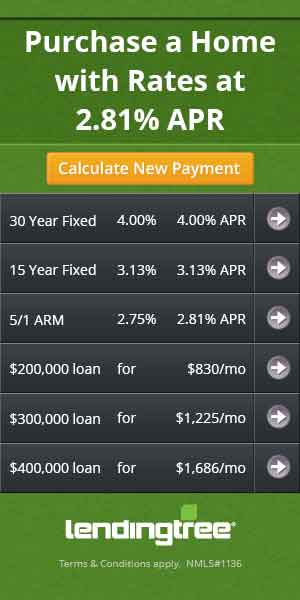Compare offers from up to 5 Lenders at LendingTree.com.
Buying Your First Home
Step 1: Look around. See what's out there that you like.
Step 2: How much can you realistically afford? (Never let yourself be 'house poor'.)
Step 3: Know how long you want to live in your new place... and how much room you'll need.
Step 4: Get pre-qualified with a Banker or Broker. Compare multiple offers in minutes!
Step 5: Find a good realtor. Choose someone you like, and can trust in the area where you are looking -- they'll know the area... this is crucial.
Step 6: Look at what YOU want to see, not just the 7 - 10 properties your realtor may want to show you. Use the internet for all it's worth... exercise your rights.
Step 7: Choose a house (apartment, condo, farm... whatever you like!), make an offer.
Step 8: Get an independent Inspector. Go with one your realtor suggests if you still trust your realtor.. remember, it's your investment, not theirs.
Step 9: Read the appraisal. Make sure you agree. Ask for any accomodations that seem reasonable.
Step 10: Buy your new house!! Or, at least, in America, enter into Escrow!! The house will be yours in 30 - 90 days! Yippee!!
(And see what kind of Tax Benefits might be available to you - there are a lot of great incentives for First Time Buyers : )

Just to give you some idea of what your new Mortgage Payments might look like, and how that compares to how much you are already paying in Rent : )

This isn't nearly as complicated as some folks make it out to be. Your first step should probably be to contact a Mortgage Broker (you can have a look at the online Mortgage Companies -- they're a great way to quickly find out how much you qualify for, and they often have better rates than the standard Banks...) or your Banker to Pre-qualify for a Mortgage.
I happen to prefer Brokers because they are waaay more likely to actually get you a mortgage! Many banks have created an environment that severely limits most people's ability to get a loan, these days. If you've gone to your bank and they've flatly turned you down, don't give up. Contact a broker and make an appointment to go over your financial information (for Goodness Sake, be honest - never embellish information with any financial institution). For the record, there are so many more options available for New Home Owners, these days. It used to be (even 5 years ago) that you had to go into a regular bank to get anywhere near a Mortgage, but no so anymore. Really do your homework to get the best possible deal out there on your Mortgage, and go with a reputable broker.
At the very least, you'll find out how much you can afford to pay for a property, or you will find out what you have to do in order to become qualified.
I have heard some bankers tell potential buyers that what they really need to do is buy lots of Retirement Savings Bonds (the banks have special names for them that you are most likely familiar with), which they happen to be selling that day… then the person can re-apply for a mortgage after their huge purchase of said banking product. Of course, now the potential home owner has no money left for a Down Payment. Much better to save your money in a safe Money Market Account at the bank (see, they're still making money, if all of a sudden you feel sorry for the banks!), or in a Savings Account that you don't regularly dip into.
Set your sights on something that is realistic. Don't go looking at all the 10,000 square foot Mansions when you haven't started saving your money for a Downpayment, yet... Start with a Condo or Smaller Home, or head out of the City to nearby Towns to see what kind of Market Prices are out there. Usually, it's way less expensive to live outside of the city, with the exception of Estate Areas, which are a lot more expensive, given that they'll have Architectural Controls to allow only very large homes.
Don't worry about the whole "I can't live in the Suburbs..." . Better to think of it as a place of your own that you own -- Own Your Own Home! Your friends can laugh at a HOMEOWNER -- who's laughing now?? hmmmm? And 2 - 10 years from now when you're ready to move on, you'll have sooo much more money to invest in your next home, and you probably won't be hanging with those crazy friends, anyway! Although it would be fun to invite them for cocktails at your new Mansion, 'cause your early investment really paid off, and now you've just finished building it! ha,ha,ha! You can laugh yourself silly, and just blame it on the drinks! (I have to assume you'll have a big 'Welcome to My Mansion, Sucka' Party, and there's most likely gonna be some alcohol consumed on the premises... It's probably a requirement in those neighborhoods -- I'll let you know as soon as I move into one! hahaha!)
Try to buy as new as you can, since Mortgage Rates are cheap, right now, and it's easier to come up with a monthly mortgage payment that is reasonable than to find the cash to fix major repairs in an older home. A house that is in very good repair is a good choice, too - it's the traditional 'fixer-upper' that used to be considered a good deal that is actually far more expensive in the long run. (There are lots of conditions, here, but this is generally a good rule of thumb.)
Make sure to find out what the Condo Fees are, if the property you're looking at has a Condo Association. Check out the house taxes, too. Some smaller towns actually have higher tax rates than larger cities. If it's a pre-owned home, you can find out the general heating/cooling costs. The important thing is not to get in over your head. Stay moderate, never go beyond your means. Remember that Brand New Homes also come with huge costs that will not be included in your Mortgage. Little things, like grass, curtains, and perhaps a fridge… weigh out the total costs to see where you'll find the easiest place to start.

You can always live there for a few years, sell it for a profit (always good!), and then make your move up. At the very least, you'll be investing the $6,000.00 (and waaay up, since that number is based on $500/month rent) a year in your own property.
If you are currently renting, the chances are really high that you could be paying less money per month on a Mortgage than you are paying for rent. This is because the Mortgage Rates are so incredibly low.
Make it a point to start taking note of the rates in your area. Start reading the Real Estate Papers, the classified ads in your local paper, and checking out Real Estate On-Line. Get a handle on what's out there that you like and can afford.
Start visiting Show Suites in Apartment Buildings and regular Show Homes. You may be surprised at the deals that are out there, these days. Go for a drive to see if there are properties For Sale in neighbourhoods that you like that are within a reasonable driving distance to your place of employment. Don't forget to add Traffic Time, if you are in a busy city! Bring a notepad and pens so you can jot down the Realtor's name and number. Often, there will be a web address, and you can check out the house on-line.
We sell our houses ourselves, so there's no reason to be wary of a 'Home For Sale By Owner'. Chances are high they've sold before and know the ropes. If you're on a time crunch, or you're new to the area, you can contact a local Realtor and tell them what you're looking for, and your price range. Again, if you're pre-qualified with a financial institution, this will be much easier. Looks can be deceiving - don't make judgements on a property until you've had a look inside. If you can imagine yourself living there, you've probably found the right place.
Write up an offer and contact a lawyer, Martha, we're buyin' a house!
Real Estate Law is pretty straight forward. If ever there was an easy consultation with a lawyer, this should be it! Your lawyer will lead you through the paperwork -- you just have to listen carefully, sign on the appropriate lines, provide any necessary documents the lawyer may require, and generally be polite! Sounds easy, eh?
You can even share a lawyer (the buyer and seller use the same lawyer when it's a nice, clean deal, with no nut cases involved…this is more common in a private sale), but chances are high you'll have your own. Make sure you have funds set aside to cover the Legal Fees (shop around - you may be surprised how these fees can vary), if they're not included in the deal. Some Builders include Legal Fees with their New Houses.
Make More Money -- Look for a New Job...
Now, I don't get why people don't have a good look at any Foreclosure Properties that might be available in their area -- especially if you are looking at buying in a Larger U.S. City, where the housing prices are through the roof. Why not have a wee look around, just in case there's something for you. That's one of the few times when it's worthwhile to buy a 'Fixer-Upper', if it's a great price.
Keep in mind that a Home can go into Foreclosure for many different reasons (Financial Difficulty can come about from a variety of sources...), so there are lots of Homes in Foreclosure that are not 'Fixer-Uppers' -- they are regular Family Homes, Condos -- sometimes even some Bare Land (a Builder's Favorite!). It's always worth a look!
More about understanding mortgages, without making you sleepy! lol! http://buildyourownhousebodylife.blogspot.com/2010/11/understanding-mortgages.html
Make a ton o' money on the Stock Market, buy that home! Yay!! Good Luck!

